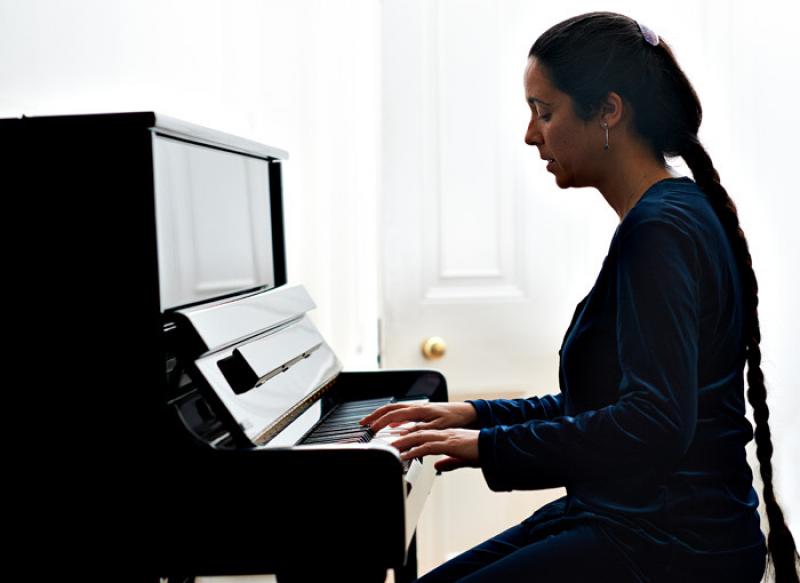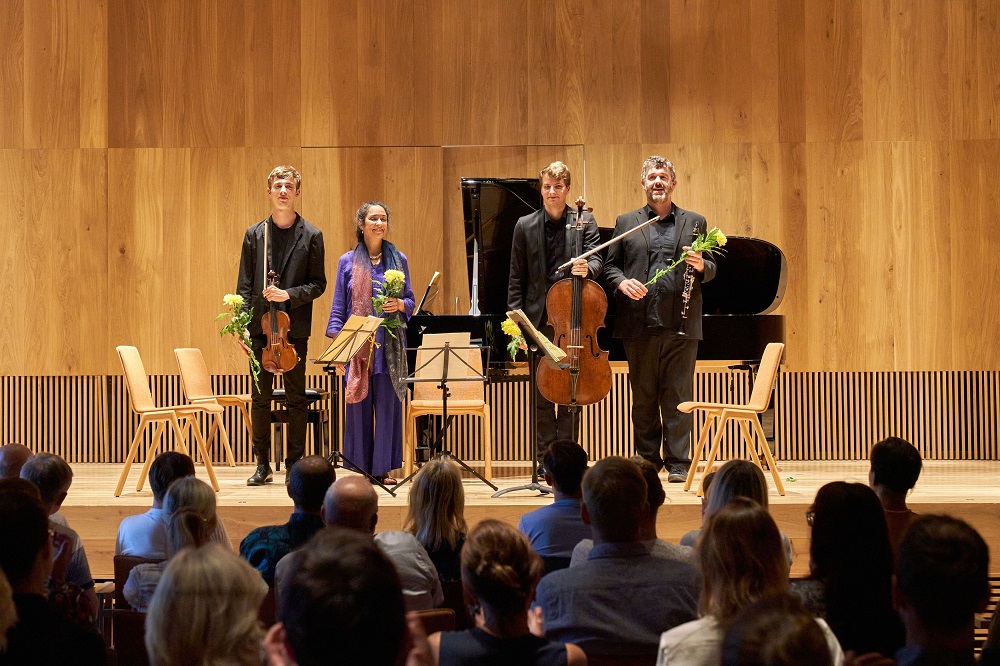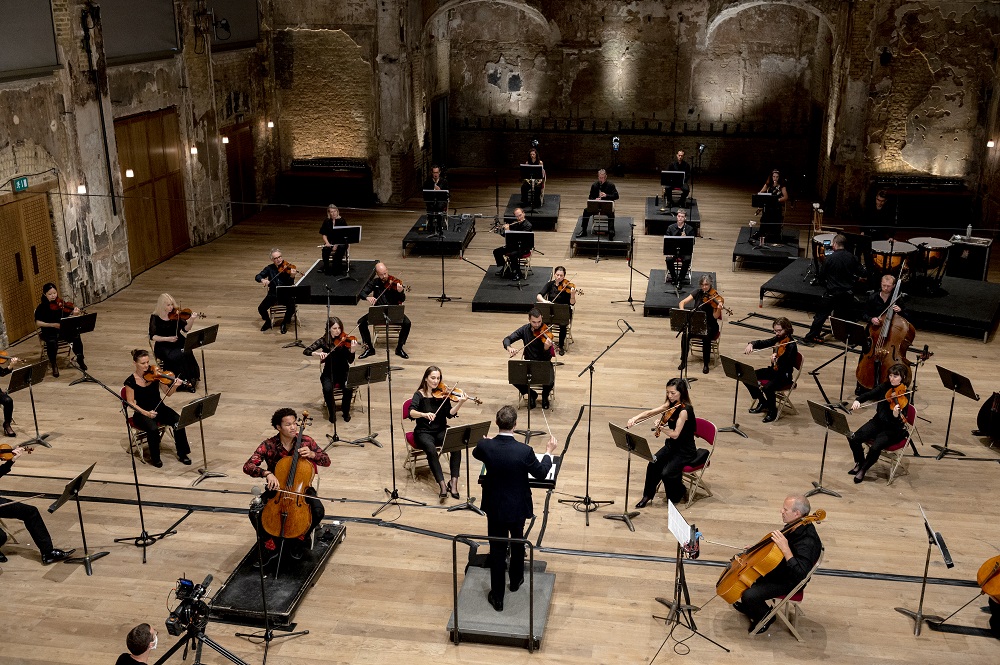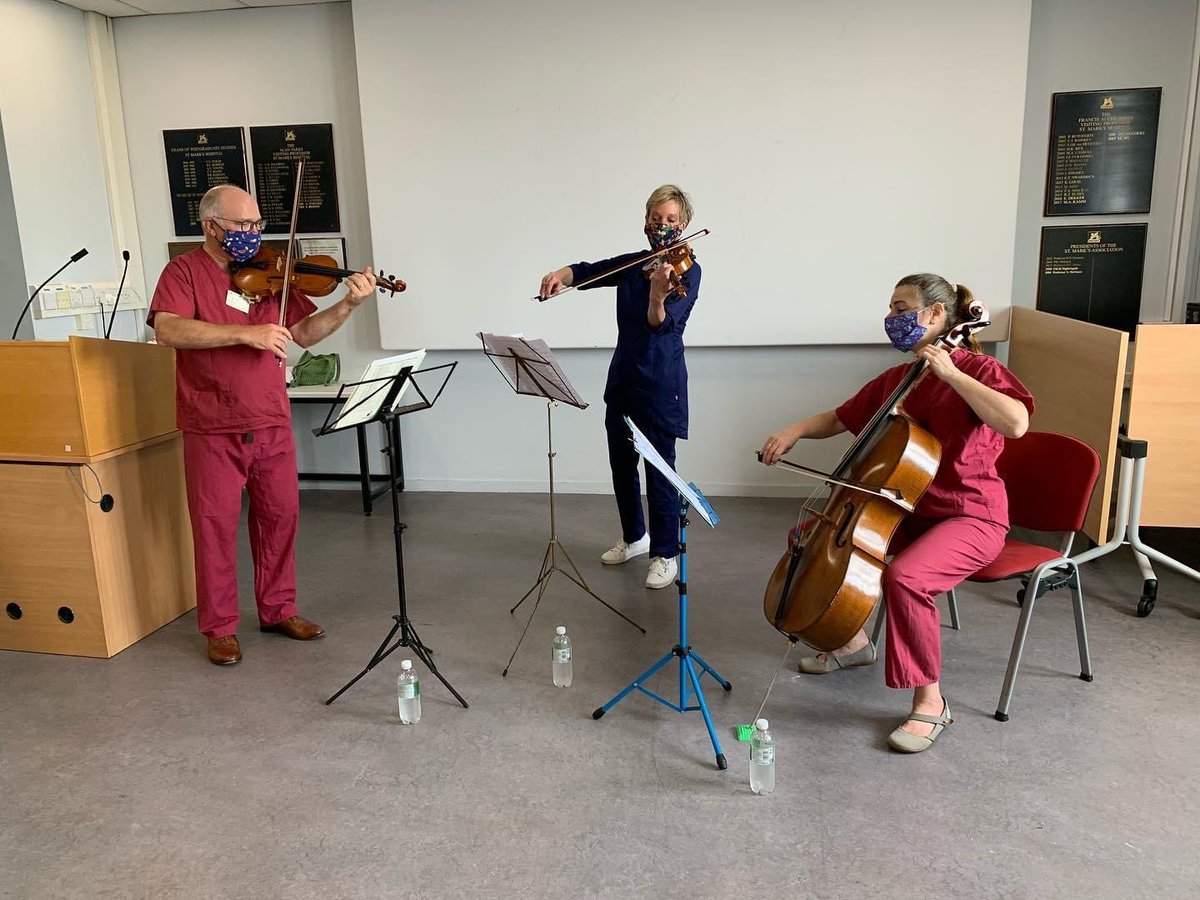'Masses of performers are still grounded': pianist Sophia Rahman on a UK music scene in crisis | reviews, news & interviews
'Masses of performers are still grounded': pianist Sophia Rahman on a UK music scene in crisis
'Masses of performers are still grounded': pianist Sophia Rahman on a UK music scene in crisis
Falling through the cracks in the benefit system, many musicians are giving up

Have you ever tried watching a film, programme or even an advert without the soundtrack? If so, you’ll know that music is a cornerstone of all the culture you enjoy, not only Strictly or the Proms. From the grandest of ceremonies to the everyday ringtone, music is involved. Could you imagine an Olympic ceremony without bands, symphony orchestras, or national and unofficial anthems?
Despite the recent opening of venues, masses of musicians, dancers and theatre people (behind the scenes as well as visible actors) are still grounded, falling through the cracks in the benefit system while many other professionals are able to take up the tools of their respective trades once again. This contrast was highlighted to me when, soon after lockdown ended, I needed to call a plumber to my home. After solving the pressing mystery of a dripping pipe, this essential worker caught sight of my piano and we began chatting about what music meant to him. He mentioned a piece of Vivaldi that had been played every morning at his school assembly, and, guessing that it was the first movement of “Spring” from The Seasons, I gave him a quick live rendition of it. The music evoked memories, stirred emotions, gave him goose-bumps. It “made his day” at work, nostalgia mingling with the heady thrill of hearing live music again and, a rare privilege in these strange times, of seeing it being made in real time by an actual human.
My new-found friend has been able to work from the moment lockdown restrictions were eased. For many self-employed musicians there is still no prospect of work on the horizon until it becomes possible to hold full-sized symphonic concerts. The dream of performing once more remains a castle-in-the-air for many, given that audience figures must be at least 80% of capacity for a symphony concert to be financially viable. Suggestions that we should play or sing more quietly fail to offer a satisfactory solution for players or listeners. (pictured below by Kaupo Kikkas: Sophia Rahman, violinist Tim Crawford, cellist Marcel Johannes Kits and clarinettist Matt Hunt take a bow after performing Messiaen's Quartet for the End of Time in the Arvo Pärt Centre this July to an out-of-lockdown Estonian audience).  If you’ve ever experienced the ensemble power of a symphony orchestra in full flow, you may be surprised to learn that its permanent members, selected through a rigorous audition and trial period, are viewed as self-employed by HMRC. Musically we may stand united, but, financially, as a musician colleague ruefully remarked, “we invented the gig economy”. Although some orchestras like the BBC four are salaried and others such as the Bournemouth Symphony have been furloughed prior to being among the first to offer a live 2020-1 season, freelance status pertains to the members of top orchestras such as the Royal Philharmonic, the London Symphony, the London Philharmonic and the Philharmonia (first Philharmonia livestreamed concert after lockdown pictured below by Camilla Greenwell). These musicians have no occupational pension, and are not entitled to parental or sick leave. The managements of such orchestras have, to their credit, tried hard to ensure that their members are not left destitute at this time. (I myself was extremely grateful to discover that the LSO had paid me for work cancelled just before lockdown).
If you’ve ever experienced the ensemble power of a symphony orchestra in full flow, you may be surprised to learn that its permanent members, selected through a rigorous audition and trial period, are viewed as self-employed by HMRC. Musically we may stand united, but, financially, as a musician colleague ruefully remarked, “we invented the gig economy”. Although some orchestras like the BBC four are salaried and others such as the Bournemouth Symphony have been furloughed prior to being among the first to offer a live 2020-1 season, freelance status pertains to the members of top orchestras such as the Royal Philharmonic, the London Symphony, the London Philharmonic and the Philharmonia (first Philharmonia livestreamed concert after lockdown pictured below by Camilla Greenwell). These musicians have no occupational pension, and are not entitled to parental or sick leave. The managements of such orchestras have, to their credit, tried hard to ensure that their members are not left destitute at this time. (I myself was extremely grateful to discover that the LSO had paid me for work cancelled just before lockdown).
Skills that have been amassed over decades of practice are teetering on the brink of being lost forever. A cellist friend with a long-term position in the Royal Philharmonic Orchestra is applying to a supermarket to stack shelves, worrying on the one hand about how to survive if this application is rejected, and on the other about how to maintain a professional level of playing in any (theoretically) leftover moments if the supermarket application is successful.
Others who currently hold key positions in orchestras are already working in care homes or for delivery services. Musicians are extremely resourceful and willing to seek alternative employment, but many are finding it hard to get other jobs at a time when better qualified or more suitable candidates are also desperately hunting for the same scarce positions. The discipline of practising an instrument to professional standard requires such all-consuming dedication that it has left many of us with an intensely specialised but narrow skill set. Within our own field, stories abound of several hundred applicants for a single teaching post, with well-qualified and highly experienced musicians finding that their application does not merit so much as a reply.  38% of Musicians’ Union members are not eligible for either the government Self Employment Income Support or furlough schemes. If more than half of your income comes from a teaching job in a conservatoire, you will not qualify for help. Given the precariousness of the profession, many freelancers have tried in the past to put something aside for a rainy day, never in their wildest nightmares imagining how torrential the last six months would turn out to be: such relatively modest savings have rendered them and their partners ineligible for Universal Credit and other benefits. Now that they are fast running out of cash, some are considering selling the family home where they have lived for decades, or their precious instruments, an integral part of their identities.
38% of Musicians’ Union members are not eligible for either the government Self Employment Income Support or furlough schemes. If more than half of your income comes from a teaching job in a conservatoire, you will not qualify for help. Given the precariousness of the profession, many freelancers have tried in the past to put something aside for a rainy day, never in their wildest nightmares imagining how torrential the last six months would turn out to be: such relatively modest savings have rendered them and their partners ineligible for Universal Credit and other benefits. Now that they are fast running out of cash, some are considering selling the family home where they have lived for decades, or their precious instruments, an integral part of their identities.
Not only the MU but a recent Treasury Committee report acknowledges that while substantial governmental support has been forthcoming in many areas, more than a million individuals are being left behind. The Rt Hon. Mel Stride MP, Chair of the Treasury Committee, said:
“The Chancellor has said that he will do whatever it takes to support people and businesses from the economic impact of the pandemic.
“Overall, he has acted at impressive scale and pace. However, the Committee has identified well over a million people who – through no fault of their own – have lost livelihoods while being locked down and locked out of the main support programmes.
“If it is to be fair and completely fulfil its promise of doing whatever it takes, the Government should urgently enact our recommendations to help those who have fallen through the gaps.”
Those who have had no source of income since February, those who still have still no prospect of work in the industry to which they have devoted their lives, nor any other prospects, are asking the government to listen.
Music promotes a quality of listening that we would do well to apply in other areas of life, not least relationships and politics. Aside from its educational and purely pleasurable benefits, it can be therapeutic, not only for patients but for the staff who care for them.
In a recent groundbreaking edition of the City of London Sinfonia’s Comfortable Classical at Home series, cellist Joely Koos was joined by two doctors who are also keen amateur violinists (pictured below). Both doctors have spoken movingly about the traumatic experience of being at the centre of the pandemic in the UK, and how music has helped them process what they have witnessed. Their performances were beamed into the hospital rooms of any patient who wished to listen alongside a regular online audience who tuned in from the comfort of their own homes.  After playing in a joyful trio arrangement of Elgar’s Salut d’amour, consultant Dr Maxton Pitcher spoke about the importance of reaching those who were currently unreachable by other means, stating that “music has this power of touching people...we’re not there physically touching them but the emotion of the occasion reaches out to them...music can help our mental and spiritual health.”
After playing in a joyful trio arrangement of Elgar’s Salut d’amour, consultant Dr Maxton Pitcher spoke about the importance of reaching those who were currently unreachable by other means, stating that “music has this power of touching people...we’re not there physically touching them but the emotion of the occasion reaches out to them...music can help our mental and spiritual health.”
Professor Vicky Jolliffe, who played a solo part in Bach’s uplifting double violin concerto, spoke of the power of “accessing individuals or environments which may not have had any connection with music…It’s wonderful now that we’re beginning to embrace the importance of bringing music live...to other environments, [like] the prison service, the hospital service, because it’s such a healing thing.”
Yehudi Menuhin’s wartime experiences led him to found his Live Music Now scheme, recognising that music is a vital lifeline for many in crisis and that the specialised skills of musicians are essential to bring this to the fore. In today’s crisis revered composer Arvo Pärt declared: “This tiny coronavirus has showed us in a painful way that humanity is a single organism and that human existence is possible only in relation to other living beings. The notion of ‘relationship’ should be understood as a maxim, as the ability to love. This [is] truly a high standard, maybe even too high for a human being.”
The Musicians’ Union general secretary Horace Trubridge. has remarked: “The Government's £1.57bn for the Arts, whilst a great investment in cultural organisations, will not filter down to the majority of musicians and creators.” Trubridge’s next sentence is even more chilling: “We still fear a huge talent exodus from the music industry which would be devastating, and take years, if not decades, to claw back”.
I am beginning to see the brain-drain effect among my friends and colleagues, with those in a position to do so choosing to emigrate (no fewer than ten of my acquaintance within a couple of weeks!) or to leave a profession where they are highly-skilled and of use to the community.
Organisations such as the Young Concert Artists Trust admirably set up a hardship fund at the beginning of the crisis to help the young artists on their roster, recognising the bleakness of the future for those who have trained intensively since childhood to reach the foothills of what had promised to be a stellar career only a matter of months earlier.
What to do in the longer term about any of the above? The relative brevity of a piece such as this means that it cannot hope to do much more than raise awareness of the plight of millions of self-employees who are not covered by any governmental scheme, and to put forward the idea that every worker, whether medic, musician or plumber, brings a unique skill set to the picture: each of us needs support in order to be able to make our own contribution to society. Unless we take care of all these skilled workers, we are in danger of losing a cultural landscape we have until now taken for granted. If, as another great musical humanitarian, Pablo Casals, noted, “the capacity to care is the thing which gives life its deepest significance”, we too should care about the human cost of this desecration of our collective cultural life, not only for the human beings at the centre of this survival battle, but because of what we stand to lose as a nation.
Explore topics
Share this article
Add comment
The future of Arts Journalism
You can stop theartsdesk.com closing!
We urgently need financing to survive. Our fundraising drive has thus far raised £49,000 but we need to reach £100,000 or we will be forced to close. Please contribute here: https://gofund.me/c3f6033d
And if you can forward this information to anyone who might assist, we’d be grateful.

Subscribe to theartsdesk.com
Thank you for continuing to read our work on theartsdesk.com. For unlimited access to every article in its entirety, including our archive of more than 15,000 pieces, we're asking for £5 per month or £40 per year. We feel it's a very good deal, and hope you do too.
To take a subscription now simply click here.
And if you're looking for that extra gift for a friend or family member, why not treat them to a theartsdesk.com gift subscription?
more Classical music
 Hallé John Adams festival, Bridgewater Hall / RNCM, Manchester review - standing ovations for today's music
From 1980 to 2025 with the West Coast’s pied piper and his eager following
Hallé John Adams festival, Bridgewater Hall / RNCM, Manchester review - standing ovations for today's music
From 1980 to 2025 with the West Coast’s pied piper and his eager following
 Kaploukhii, Greenwich Chamber Orchestra, Cutts, St James's Piccadilly review - promising young pianist
A robust and assertive Beethoven concerto suggests a player to follow
Kaploukhii, Greenwich Chamber Orchestra, Cutts, St James's Piccadilly review - promising young pianist
A robust and assertive Beethoven concerto suggests a player to follow
 Robin Holloway: Music's Odyssey review - lessons in composition
Broad and idiosyncratic survey of classical music is insightful but slightly indigestible
Robin Holloway: Music's Odyssey review - lessons in composition
Broad and idiosyncratic survey of classical music is insightful but slightly indigestible
 Classical CDs: Wolf-pelts, clowns and social realism
British ballet scores, 19th century cello works and contemporary piano etudes
Classical CDs: Wolf-pelts, clowns and social realism
British ballet scores, 19th century cello works and contemporary piano etudes
 Bizet in 150th anniversary year: rich and rare French offerings from Palazzetto Bru Zane
Specialists in French romantic music unveil a treasure trove both live and on disc
Bizet in 150th anniversary year: rich and rare French offerings from Palazzetto Bru Zane
Specialists in French romantic music unveil a treasure trove both live and on disc
 Scottish Chamber Orchestra, Ibragimova, Queen’s Hall, Edinburgh review - rarities, novelties and drumrolls
A pity the SCO didn't pick a better showcase for a shining guest artist
Scottish Chamber Orchestra, Ibragimova, Queen’s Hall, Edinburgh review - rarities, novelties and drumrolls
A pity the SCO didn't pick a better showcase for a shining guest artist
 Kilsby, Parkes, Sinfonia of London, Wilson, Barbican review - string things zing and sing in expert hands
British masterpieces for strings plus other-worldly tenor and horn - and a muscular rarity
Kilsby, Parkes, Sinfonia of London, Wilson, Barbican review - string things zing and sing in expert hands
British masterpieces for strings plus other-worldly tenor and horn - and a muscular rarity
 From Historical to Hip-Hop, Classically Black Music Festival, Kings Place review - a cluster of impressive stars for the future
From quasi-Mozartian elegance to the gritty humour of a kitchen inspection
From Historical to Hip-Hop, Classically Black Music Festival, Kings Place review - a cluster of impressive stars for the future
From quasi-Mozartian elegance to the gritty humour of a kitchen inspection
 Shibe, LSO, Adès, Barbican review - gaudy and glorious new music alongside serene Sibelius
Adès’s passion makes persuasive case for the music he loves, both new and old
Shibe, LSO, Adès, Barbican review - gaudy and glorious new music alongside serene Sibelius
Adès’s passion makes persuasive case for the music he loves, both new and old
 Anja Mittermüller, Richard Fu, Wigmore Hall review - a glorious hall debut
The Austrian mezzo shines - at the age of 22
Anja Mittermüller, Richard Fu, Wigmore Hall review - a glorious hall debut
The Austrian mezzo shines - at the age of 22
 First Person: clarinettist Oliver Pashley on the new horizons of The Hermes Experiment's latest album
Compositions by members of this unusual quartet feature for the first time
First Person: clarinettist Oliver Pashley on the new horizons of The Hermes Experiment's latest album
Compositions by members of this unusual quartet feature for the first time

Comments
It's great that this article
It is a shame that we cannot